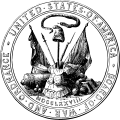| Army of the James | |
|---|---|
 The Negro quarters of the Army of the James | |
| Active | April 1864–August 1865 |
| Country | |
| Branch | |
| Type | Field army |
| Engagements | American Civil War |
| Commanders | |
| Notable commanders | Benjamin F. Butler Edward Ord |
The Army of the James was a Union Army that was composed of units from the Department of Virginia and North Carolina and served along the James River during the final operations of the American Civil War in Virginia.
